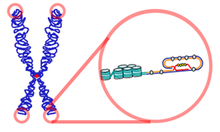Dr. Elizabeth H. Blackburn, a biochemist at the University of California, San Francisco, shared the 2009 Nobel Prize in Medicine or Physiology for her discovery of the process of telomere shortening. Her research revealed that telomeres and telomerase may play central roles in how we age. Telomeres are special segments of noncoding DNA at the very ends of chromosomes.
The telomeres protect the ends of chromosomes from fraying. The problem is that every time the cell divides and the DNA is copied, some of that telomere get shortened until the length would hit a critical point. She also discovered an enzyme that could replenish and restore the length of telomeres, and she named it telomerase.
The shortened telomeres play a role in aging by the erosion of the DNA over time. It means that the telomeres’ length is connected to ageing and going from healthy to diseased. She revealed that telomere attrition is also contributing to physiological changes in the body such as increasing risks of getting various types of diseases, such as cardiovascular diseases, Alzheimer’s, some cancers, and diabetes.
The risks of the diseases of ageing cannot be reduced by telomerase since although increasing the telomerase decreases the risks of some diseases, the higher levels of it also increase the risks of certain and rather serious cancers such as brain tumours, melanoma, and lung cancers. So, she carried out experiments to discover ways to control our telomeres’ length and thus health, without taking cancer risks.
She discovered the relationship between perceived stress and telomere length, which clearly indicated that the more chronic stress you are under, the significantly shorter the telomeres. The results of the study are shown below, Figure2.
In addition, her further study discovered that negative thinkers who perceive their life events under greater stress were found to have shorter telomeres and lower telomerase activity. On the other hands, people, who experience their circumstances not as a threat, but as a challenge had been able to maintain their telomeres.
This study indicates that we have control over the way we age all the way down into our cells. People’s life events and the way they perceive these events can affect on the telomeres length. Physical activity as a form of meditation may also control the shortening effect on telomeres. Therefore, telomere length wasn’t just a matter of age counted in years, but it was a matter of attitude.
People who have experienced emotional neglect, exposure to violence, or bullying consistently have shorter telomeres while tight-knit communities and lifelong friendships improve telomere maintenance. Dr.Elizabeth H. Blackburn said, ” It‘s telling us that I have the power to impact my own telomeres, and I also have the power to impact yours. Telomere science has told us just how interconnected we all are.”
The video below explains the relationship between accelerated telomere shortening and life stress. See source here.
-Subi Kim
References:
E. S. Epel et al. Accelerated telomere shortening in response to life stress. 2004. The National Academy of Sciences. 101:17312-17315. doi: https://doi.org/10.1073/pnas.0407162101.
Roxy, P., Chris, O., Jay, D. (2011) Introduction to Statistics and Data Analysis. Boston, MA: Nelson Education.



2 responses to “Life Stress and Telomere Length”